人教PEP版六年级下册英语重点知识总结
【口袋书】人教版PEP六年级下册英语 基础知识汇总
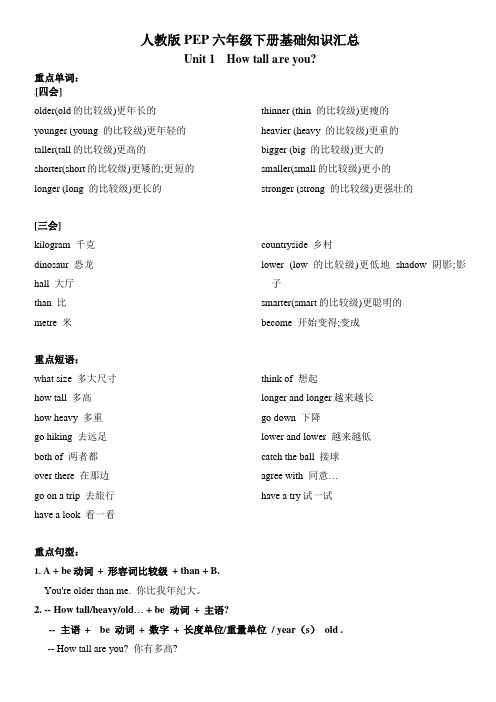
人教版PEP六年级下册基础知识汇总Unit 1 How tall are you?重点单词:[四会]older(old的比较级)更年长的younger (young 的比较级)更年轻的taller(tall的比较级)更高的shorter(short的比较级)更矮的;更短的longer (long 的比较级)更长的thinner (thin 的比较级)更瘦的heavier (heavy 的比较级)更重的bigger (big 的比较级)更大的smaller(small的比较级)更小的stronger (strong 的比较级)更强壮的[三会]kilogram 千克dinosaur 恐龙hall 大厅than 比metre 米countryside 乡村lower (low 的比较级)更低地shadow 阴影;影子smarter(smart的比较级)更聪明的become 开始变得;变成重点短语:what size 多大尺寸how tall 多高how heavy 多重go hiking 去远足both of 两者都over there 在那边go on a trip 去旅行have a look 看一看think of 想起longer and longer越来越长go down 下降lower and lower 越来越低catch the ball 接球agree with 同意…have a try试一试重点句型:1.A + be动词+ 形容词比较级+ than + B.You're older than me. 你比我年纪大。
2. -- How tall/heavy/old… + be 动词+ 主语?-- 主语+ be 动词+ 数字+ 长度单位/重量单位/ year(s)old .-- How tall are you? 你有多高?-- I'm 1. 65 metres. 我身高1. 65米。
人教PEP版六年级英语下册 单元考点专项梳理(含答案)

人教PEP版六年级英语下册单元考点专项梳理Unit 2介绍过去的活动班级:姓名:得分: . 一重点词汇。
(英汉互译)(一)动词过去式1.(clean的过去式)打扫2.(stay的过去式)停留;待3.(wash的过去式)洗4.(watch的过去式)看5.(have的过去式)患病;得病6.(sleep的过去式)睡觉7.(read的过去式)读8.(see的过去式)看见9.drank10.fixed(二)名词类1.show2.magazine3.hotelmp(三)其他类1.最近的;上一个的2.昨天3.在……之前4.better5.faster6.broken7.loud8.enjoy9.stay(四)短语类1.待在家里2.看电视3.打扫我的房间4.洗我的衣服5.感冒6.看书7.看电影8.drink tea9.talk aboutst weekendst nightst Monday13.the day before yesterday14.a lot of二重点句子。
(汉译英)(一)询问及回答周末过得怎么样——你周末过得怎么样?——很好,谢谢。
_________________________________________________________________ _________________________________________________________________ __(二)介绍或询问及回答某人过去做什么了1.——你上周六做什么了?——我待在家里看电视了。
_________________________________________________________________ _________________________________________________________________ __2.——你上周末做什么了?——我看了电影。
_________________________________________________________________ _________________________________________________________________ __3.我整个周末都待在家里睡觉。
新人教pep版六年级英语下册unit1复习总结

新人教pep版六年级英语下册unit1复习总结一、单词巩固:(写出下列形容词的比较级)一、重点句子。
1.I’m taller than this dinosaur.我比这只恐龙高。
2.Some dinosaurs are bigger than houses.Some are smaller than our schoolbags.一些恐龙比房子大。
一些比我们的书包小。
3.询问体重的问句:--How heavy is it?它体重多少?--It’s five tons.它5吨。
4.询问鞋子的尺码:--What size are your shoes?你穿多大号的鞋?--What are your shoes?你穿多大号鞋?--My shoes are size35.我穿35号的鞋。
5.询问高度:--How tall is it?它有多高?--Maybe4metres.可能4米。
--I’m1.65metres.我身高1.65米。
--Size7.7号。
6.询问体重:--How heavy are you?你体重多少?--I’m48kilograms.我体重48千克。
课堂操练:按要求完成句子。
1.I am46kilograms.(对画线部分提问)1.Ⅰwear size37in China.(对画线部分提问)2.My friend is9years old.(对画线部分提问)3.Peter is shorter than Sam.(对画线部分提问)5.I am stronger than my brother.(改为一般疑问句)三、语法专项:形容词比较级的规则变化:单音节词和少数双音节词:(1)一般在词尾加“er”。
例如:tall—taller,young younger,old一older,small smaller。
(2)以字母“e”结尾的词,加“r”。
例如:fine—finer,nice-nicer,late-later。
Unit 2 Last weekend 知识点(知识清单)人教PEP版英语六年级下册

小学英语人教PEP 版六年级下册Unit 2 Last weekend 知识点清单一、词汇1.动词短语及活动相关◆clean my room:打扫房间是日常家务之一,能让房间保持整洁。
例如:I usually clean my room on weekends to make it look nice.(我通常在周末打扫我的房间以使它看起来漂亮。
)◆wash my clothes:洗衣服是生活中必备的事情。
比如:My mothertaught me how to wash my clothes last weekend.(我妈妈上周末教我如何洗衣服。
)◆stay at home:有时我们会选择待在家里休息或做一些室内活动。
像:It was raining heavily last weekend, so I had to stay at home.(上周末雨下得很大,所以我不得不待在家里。
)◆watch TV:看电视是常见的休闲方式,可以观看各种节目。
例如:I like to watch TV in the evening. Last weekend, I watched adocumentary about animals.(我喜欢在晚上看电视。
上周末,我看了一部关于动物的纪录片。
)◆read a book:读书能增长知识和丰富想象力。
例如:I often read abook before going to sleep. Last weekend, I read a novel and reallyenjoyed it.(我经常在睡觉前读书。
上周末,我读了一本小说并且非常喜欢它。
)◆see a film:看电影是一种很好的娱乐活动,可以在电影院享受大屏幕的视觉体验。
例如:My friends and I went to see a film last weekend.It was a comedy and made us laugh a lot.(我和我的朋友们上周末去看了一部电影。
人教版六年级英语下册重点句型语法总结

人教版六年级英语下册重点句型语法总结人教版PEP教材在小学阶段涉及的重要语法知识主要有7种:to be句型、there be句型、一般现在时句型、现在进行时句型、一般过去时句型、情态动词can引导的句型、be going to句型等,简要总结如下:[一] to be句型:用于介绍个人情况如姓名、健康状况、身份、国籍、家庭成员、朋友、职业等,描述地点、颜色、四季、日期、星期几等1. Who’s your English teacher?Mr. Carter.2. What’s he like? He’s tall and strong.3. Is she quiet? No, she isn’t.She is very active.4. Is she strict? Yes, she is, but she’s very kind.5. What day is it today? It’s Wednesday.6. What’s your favourite fruit/food…?7. They’re sweet/ sour/ salty/ healthy/…8. When is your birthday? It’s in May.9. My birthday is in June. Uncle Bill’s birthday is in June, too.10. Is her birthday in June? Yes, it is.11. What’s the date?12.This is Zhang Peng.13. Where is the cinema, please? It’s next to the hospi tal.14. How tall are you?I’m 164 cm tall.15. You are shorter than me.16.You’re 4 cm taller than me.17.How heavy are you? I’m 48 kg.18. I’m thinner than you, and shorter.19. What’s the matter with you?My throat is sore.20. How are you, Liu Yun / Sarah?[二] there be句型:表示存在,即:“某处有某物”或“某时有某事”。
人教PEP版英语六年级下册Unit 1-4知识点总结(期末复习)
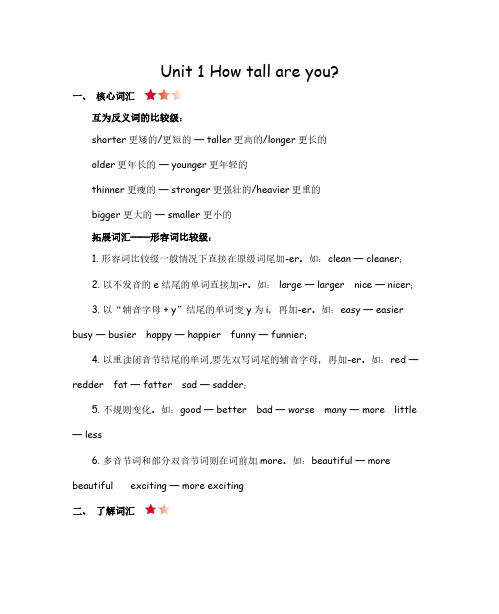
Unit1How tall are you?一、核心词汇互为反义词的比较级:shorter更矮的/更短的—taller更高的/longer更长的older更年长的—younger更年轻的thinner更瘦的—stronger更强壮的/heavier更重的bigger更大的—smaller更小的拓展词汇——形容词比较级:1.形容词比较级一般情况下直接在原级词尾加-er。
如:clean—cleaner;2.以不发音的e结尾的单词直接加-r。
如:large—larger nice—nicer;3.以“辅音字母+y”结尾的单词变y为i,再加-er。
如:easy—easier busy—busier happy—happier funny—funnier;4.以重读闭音节结尾的单词,要先双写词尾的辅音字母,再加-er。
如:red—redder fat—fatter sad—sadder;5.不规则变化。
如:good—better bad—worse many—more little —less6.多音节词和部分双音节词则在词前加more。
如:beautiful—more beautiful exciting—more exciting二、了解词汇dinosaur恐龙hall大厅metre米(美式英语:meter)than比both两个都kilogram千克;公斤countryside乡村lower(low的比较级)更低地shadow阴影;影子smarter(smart的比较级)更聪明的become开始变得;变成三、核心句型1.—How tall are you?你有多高?—I’m1.64metres.我身高1.64米。
2.—What size are your shoes,Mike?迈克,你穿多大号的鞋?—Size7.7号。
3.—How heavy are you?你体重多少?—I’m48kilograms.我体重48公斤。
六年级下册英语素材(知识梳理)-Unit 3 Where did you go 人教PEP版

Unit 3Where did you go?【重点词汇】四会(能听、说、读、写)went (go的过去式) 去hurt (hurt的过去式) (使)受伤camp 野营ate (eat的过去式) 吃went camping (尤指在假日) 野营took (take的过去式) 拍照fish 钓鱼;捕鱼took pictures 照相went fishing 去钓鱼bought (buy的过去式) 买rode (ride的过去式) 骑(马;自行车) gift 礼物三会(能听、说、认读)fell (fall的过去式) 摔倒till 直到off 从(某处)落下beach 海滩;沙滩Labour Day 劳动节basket 篮;筐mule 骡子part 角色Turpan 吐鲁番licked (lick的过去式) 舔could (can的过去式) 能laughed (laugh的过去式) 笑【重点句型】1. —Where did you go? 你去哪儿了?—I went to Mt.Tianshan, Xinjiang. 我去了新疆的天山。
2. —Did you go to Turpan?你们去吐鲁番了吗?—Yes, we did. 是的,去了。
3. —How did you go there?你们怎么去的?—We went there by plane. 我们坐飞机去的。
4. —How was the beach?沙滩环境怎么样?—It was beautiful. 环境很美。
5. What happened?怎么了?6. —Are you all right?你还好吧?—I'm OK now. 我现在没事了。
7. It looks like a mule!它看起来像头骡子!8. Sounds great!听上去不错!【重点语法】1. —Where did you go?你去哪儿了?—I went to Mt.Tianshan, Xinjiang. 我去了新疆的天山。
PEP人教版六年级下册英语重点知识总结 unit2

Unit 2 What’s the matter, Mike?一、单词与短语1.have a fever 发烧2.have a sore throat喉咙疼3.have a cold感冒4.have a toothache 牙疼5. have a headache 头疼6.matter事情,麻烦7.sore 疼的8.hurt疼痛9.nose 鼻子10.tired疲劳的,累的11.excited兴奋的12.angry生气的13.happy高兴的14.bored无聊的,烦人的15.sad 忧伤的,悲伤的16.sick 不舒服17. take some medicine 吃点药18.have the flu患流感二、句型1. What’s the matter? 你怎么啦?2. How do you feel? 你感觉如何?How dose Amy feel? Amy感觉如何?3. My leg hurts. 我腿疼。
I have a toothache. 我牙疼。
4. Do you have a sore throat? 你喉咙疼吗?5. Don’t worry! 别担心!6. You will feel better soon! 你很快会好起来的!7. You look happy. 你看起来很开心。
8. I feel very sad. 我感觉很伤心。
三、对话Doctor: How do you feel? 你感觉如何?Amy: I feel sick. 我不舒服。
Doctor: What’s the matter? 你怎么啦?Amy: I have a fever. 我发烧了。
Doctor: let me see. 让我看看。
Do you have a sore throat? 你喉咙疼吗?Amy: Yes. My throat is sore. 是的。
我的喉咙很疼。
Doctor: Don’t worry! Take some medicine. You will feel better soon! 别担心,吃点药就好了!Amy: Thank you very much!非常感谢!Doctor: You are welcome! 不客气!练习题一、翻译下列短语(10分)感冒发高烧头痛have a sore throat牙痛二、选词填空(20分)1 、What’s the (matter, wrong) with you?2、I (have, feel ) a fever.3、My throat is (sore, ill).4、What’s wrong (for, with) you?5、You’d better go to (see, look) a doctor.三、选答句(20分)1. Does Lisa feel angry? ( )2. Do Chen Jie go swimming with her parents? ( ) 3. What is the matter with you, John? ( )4. How do you go to Beijing? ( )5. What do you do when you hurt your leg? ( )四、补全对话。
Unit3+where+did+you+go+知识点梳理-2024学年人教PEP版英语六年级下册
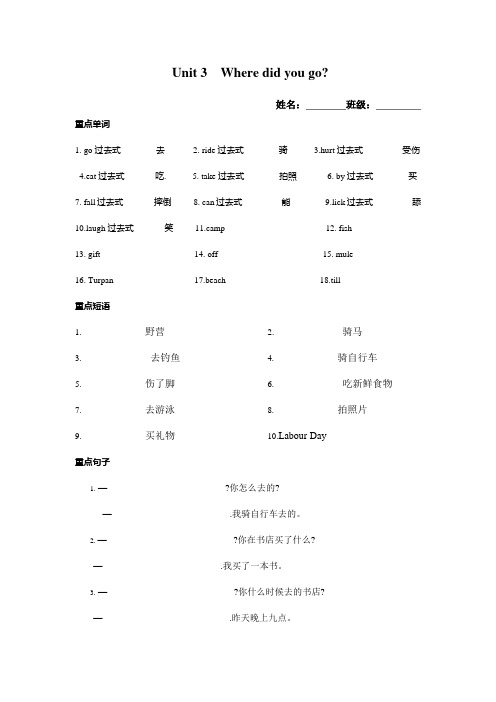
Unit 3Where did you go?姓名:________班级:_________重点单词1. go过去式_______ 去2. ride过去式_______ 骑3.hurt过去式________ 受伤4.eat过去式_______吃.5. take过去式_______ 拍照6. by过去式_______ 买7. fall过去式_______摔倒8. can过去式_______ 能9.lick过去式_______ 舔ugh过去式_______笑11.camp_________ 12. fish___________13. gift _________ 14. off_________ 15. mule_________16. Turpan _________ 17.beach _________ 18.till _________重点短语1. ______________野营2. ______________骑马3.______________去钓鱼4. ______________骑自行车5. ______________伤了脚6. ______________吃新鲜食物7. ______________去游泳8. ______________拍照片9. ______________买礼物bour Day______________重点句子1.—___________________________?你怎么去的?—___________________________.我骑自行车去的。
2. —_____________________________?你在书店买了什么?—___________________________.我买了一本书。
3.—_____________________________?你什么时候去的书店?—_____________________________.昨天晚上九点。
2020新人教版(PEP)小学英语六年级下册各单元知识点总结
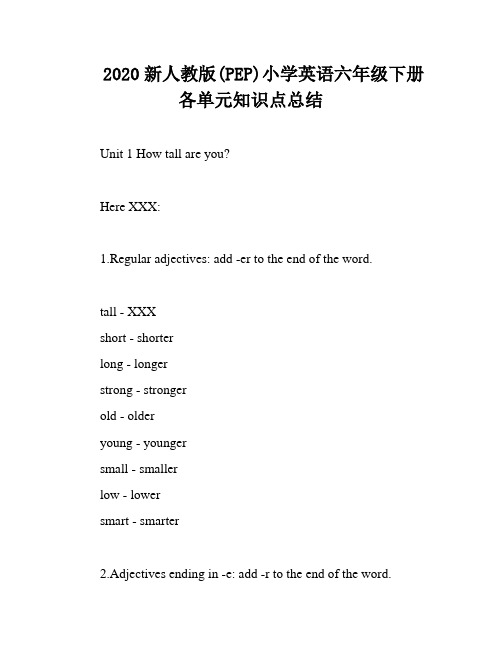
2020新人教版(PEP)小学英语六年级下册各单元知识点总结Unit 1 How tall are you?Here XXX:1.Regular adjectives: add -er to the end of the word.tall - XXXshort - shorterlong - longerstrong - strongerold - olderyoung - youngersmall - smallerlow - lowersmart - smarter2.Adjectives ending in -e: add -r to the end of the word.large - largerlate - latersimple - simplersafe - safer3.Adjectives XXX: double the final consonant and add -er.big - biggerXXX - XXXfat - fattersad - sadderhot - hotterwet - wetter4.Adjectives ending in -y: change the -y to -i and add -er.happy - happierheavy - XXXXXX - funnierangry - angrierXXX - XXXwindy - windierbusy - busierearly - earlierXXX:dinosaur。
hall。
than。
both。
meter。
kilogram。
size。
feet。
wear。
countryside。
shadow。
e.Here XXX:1.Asking about age。
height。
weight。
etc.How old are you?How tall are you?How heavy are you?I am (age) years old。
人教版PEP版英语六年级下册第一单元重点知识集锦

PEP六年级下册单元重点知识集锦Unit1一.单词(教材54页Unit1,共计22个)二.短语1.how heavy多重2.what size什么尺码3.how tall多高4.both of us我们两个5.more dinosaurs更多的恐龙6.how old多大7.go shopping去购物8.go hiking去远足9.have a look at看一看10.think of想起11.any other任何其他的12.go on a trip to去旅行13.go down下沉、下降14.get lower and lower变得越来越低15.my shadow我的影子16.agree with同意17.talk about谈论18.have a try试一试19.an excellent goal keeper一个优秀的足球守门员20.need teamwork需要团结三.知识点1.how的用法(1)问身体健康等情况。
How are your parents?你父母身体好吗?How are things in your father’s factory?你爸爸厂里的情况怎么样?(2).问天气状况。
How is the weather today?今天天气怎么样?(3)询问方式。
How does your mother go to work every day?你妈妈每天怎么去上班?How can I carry the box upstairs?我怎样才能把这箱子搬到楼上呢?(4)询问程度。
How do you like this book?你觉得这本书怎么样?(5)How old问年龄、年代。
How old is your friend?你朋友多大了?How old is the bridge?这座桥有多少年代了?(6)How many问可数名词数量。
常将可数名词复数紧随其后。
如:How many pictures are there on the wall?墙上有多少幅画?How many glasses of milk would you like?你们想要几杯牛奶?(7).How much询问不可数名词的数量、物品的价格。
人教PEP版-英语-六年级下册-Module 2 重点细归纳

重点细归纳Ⅰ、单词later /leitə/后来,以后duck/dʌk/鸭子pond/pɔnd/池,池塘cloud/klaud/云sure/ʃuə/确信的dry/dral/干的look like/luk laik/看来好像stay/stei/保持,维持Ⅱ、词组have a picnic去野餐half past eleven十一点半have breakfast吃早餐on the pond在池塘里over there在那边be sunny晴朗的be cloudy多云after dinner饭后Ⅲ、语法l.I'm going to get up and have breakfast.我将起床去吃早餐该句式为“be going to+v原形”构成的一般将来时,表示计划,打算要做的事或即将发生的事。
如:It's going to be fine tomorrow.明天天气要转好。
2.It will be cloudy in Tianjin.天津将是多云天气。
will+动词原形(当主语是第一人称时,一般用shall,其它人称则用will)。
cloudy多云的,形容词,表示“阴、晴、雨、雪、雾”等名词时,词尾加“y”构成形容词,注意,以重读闭音节结尾的词,要双写词尾的辅音字母,再加“y“,如:sun→sunny,fog→foggy。
知识小窗口谈天气英美人花那么多时间去讨论天气令中国人十分不解。
首先是由于英国所处的地理位置使英国具有别国所不具备的特殊气候特征。
英国的气候,一年之中有半年是绵绵的阴雨天,首都伦敦天气有时一天可有四次变化,早晨的伦敦经常大雾弥漫,伸手五指依稀可辨,有时白天竟然如同黑夜一般,“雾都”由此而得名。
更主要的原因是国为他们不愿意同不熟悉的人谈论诸如年龄、收入、家庭等个人隐私问题。
在公共场合以谈论天气作为谈话的开场白,既管用又不得罪人,而且它还有活跃气氛、打破冷场或由此及彼引出话题等功能,一般不是为谈天气而谈天气。
六年级下册人教版(PEP)英语第二单元知识点

练习:规则动词
work__w_or_k_ed play__p_la_y_ed want__w_a_nt_ed
look__lo_ok_e_d watch__w_a_tc_hed live___liv_e_d
move__m_o_ve_d taste__ta_s_te_d hope__h_op_e_d
love__lo_ve_d_ liwas your weekend? 答:It was+形容词.
二.一般过去时标志词(过去的时间)
③ago系列 一段时间+ago:…前 (几年/几个月/几天/几周)+ago (几小时/几分钟/几秒)+ago two years ago两年前 three months ago三个月前 four weeks ago四周前
five days ago五天前 an hour ago一小时前 five minutes ago五分钟前 two seconds ago两秒前
二.一般过去时标志词(过去的时间)
①yesterday系列:昨天 yesterday+(早/中/晚) yesterday morning昨天早上 yesterday afternoon昨天下午 yesterday evening昨天晚上 the day before yesterday前天
二.一般过去时标志词(过去的时间)
4.你们上周做什么了? 我们打扫教室了。 What did you do last week? We cleaned our classroom. 5.他上周末做了什么? 他呆在家里了。 What did he do last weekend? He stayed at home.
6.她上周五做了什么? 她看了一本书。 What did you do last Friday? She read a book.
人教版(PEP)小学英语六年级下册 Recycle 知识点总结
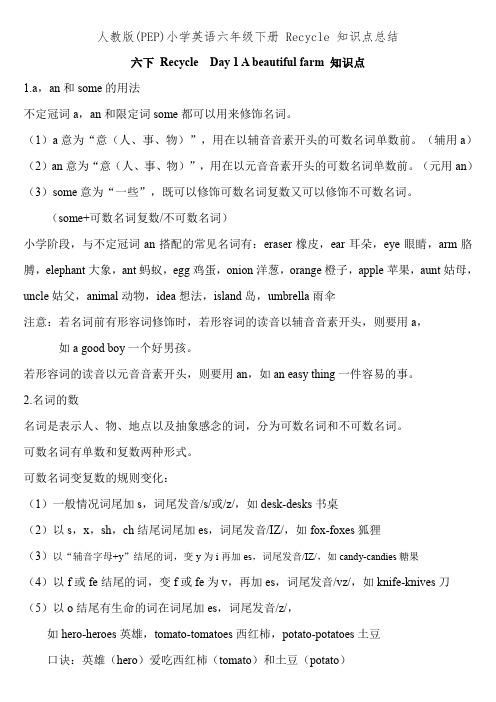
人教版(PEP)小学英语六年级下册 Recycle 知识点总结六下Recycle Day 1 A beautiful farm 知识点1.a,an和some的用法不定冠词a,an和限定词some都可以用来修饰名词。
(1)a意为“意(人、事、物)”,用在以辅音音素开头的可数名词单数前。
(辅用a)(2)an意为“意(人、事、物)”,用在以元音音素开头的可数名词单数前。
(元用an)(3)some意为“一些”,既可以修饰可数名词复数又可以修饰不可数名词。
(some+可数名词复数/不可数名词)小学阶段,与不定冠词an搭配的常见名词有:eraser橡皮,ear耳朵,eye眼睛,arm胳膊,elephant大象,ant蚂蚁,egg鸡蛋,onion洋葱,orange橙子,apple苹果,aunt姑母,uncle姑父,animal动物,idea想法,island岛,umbrella雨伞注意:若名词前有形容词修饰时,若形容词的读音以辅音音素开头,则要用a,如a good boy一个好男孩。
若形容词的读音以元音音素开头,则要用an,如an easy thing一件容易的事。
2.名词的数名词是表示人、物、地点以及抽象感念的词,分为可数名词和不可数名词。
可数名词有单数和复数两种形式。
可数名词变复数的规则变化:(1)一般情况词尾加s,词尾发音/s/或/z/,如desk-desks书桌(2)以s,x,sh,ch结尾词尾加es,词尾发音/IZ/,如fox-foxes狐狸(3)以“辅音字母+y”结尾的词,变y为i再加es,词尾发音/IZ/,如candy-candies糖果(4)以f或fe结尾的词,变f或fe为v,再加es,词尾发音/vz/,如knife-knives刀(5)以o结尾有生命的词在词尾加es,词尾发音/z/,如hero-heroes英雄,tomato-tomatoes西红柿,potato-potatoes土豆口诀:英雄(hero)爱吃西红柿(tomato)和土豆(potato)(6)以o结尾无生命的词在词尾加s,词尾发音/z/,如photo-photos,radio-radios收音机Day 2 Farmer’s market 知识点1.反义词归纳:(1)表示动作的词:come来—go去,open开—close关,cry哭—laugh笑,star开始—stop停止,buy买—sell卖,borrow借来—return归还,push推—pull拉,take拿走—bring带来,fall落下—rise升起,ask问—answer答,love爱—hate恨,teach教—learn学习,lose丢失—find找到,forget忘记—remember记住(2)形容体貌的词:fat胖的—thin瘦的,beautiful美丽的—ugly丑陋的,tall高的—short矮的,light轻的—heavy重的,young年轻的—old年老的,long长的—short短的,strong强壮的—weak虚弱的(3)表示方位的词:east东—west西,south南—north北,up向上—down向下,front前面—back后面,inside在里面—outside在外面,in里面—out外面,over在...上面—under在...下面(4)其他:cold冷的—hot热的,cool凉爽的—warm暖和的,hard硬的—soft软的, clean干净的—dirty脏的,new新的—old旧的,poor穷的—rich富的,dark黑色的—bright明亮的,black黑色的—white白色的,good好的—bad坏的,happy高兴地—sad悲伤的,far远的—near近的,clever聪明的—stupid笨的,late晚的—early早的,free空闲的—busy忙碌的,right对的—wrong错的, more更多的—less更少的,dry干的—wet湿的,active活泼的—quiet安静的2.特殊疑问词:what什么,询问内容:What did you do last night?你昨天晚上做什么了?when什么时候,询问时间:When do you get up?你什么时候起床?where在哪里,询问地点:Where is my pen?我的钢笔在哪里?who谁,询问人:Who did you go with?你和谁一起去的?--My parents.我的父母。
六年级英语下学期(PEP人教版)全册单元知识点复习资料
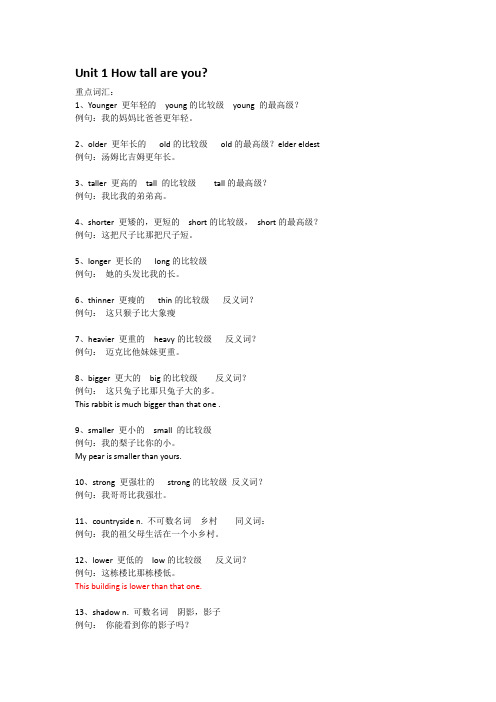
Unit 1 How tall are you?重点词汇:1、Younger 更年轻的young的比较级young 的最高级?例句:我的妈妈比爸爸更年轻。
2、older 更年长的old的比较级old的最高级?elder eldest 例句:汤姆比吉姆更年长。
3、taller 更高的tall 的比较级tall的最高级?例句:我比我的弟弟高。
4、shorter 更矮的,更短的short的比较级,short的最高级?例句:这把尺子比那把尺子短。
5、longer 更长的long的比较级例句:她的头发比我的长。
6、thinner 更瘦的thin的比较级反义词?例句:这只猴子比大象瘦7、heavier 更重的heavy的比较级反义词?例句:迈克比他妹妹更重。
8、bigger 更大的big的比较级反义词?例句:这只兔子比那只兔子大的多。
This rabbit is much bigger than that one .9、smaller 更小的small 的比较级例句:我的梨子比你的小。
My pear is smaller than yours.10、strong 更强壮的strong的比较级反义词?例句:我哥哥比我强壮。
11、countryside n. 不可数名词乡村同义词:例句:我的祖父母生活在一个小乡村。
12、lower 更低的low的比较级反义词?例句:这栋楼比那栋楼低。
This building is lower than that one.13、shadow n. 可数名词阴影,影子例句:你能看到你的影子吗?14、smarter 更聪明的smart的比较级例句:你变得越来越聪明了。
You are getting smarter and smarter.15、become v. 开始变得,变成例句:这个女孩想成为一名演员。
This girl wants to become an actress.重点短语:How tall 多高how heavy 多重how old 多大what size 多大号In this hall 在这个厅里both of 两个都over there 在那边have a look 看一看Go down 下降重点句型:①形容词的最高级:最高级通常用于3人或者3人以上的人或事物之间的比较。
- 1、下载文档前请自行甄别文档内容的完整性,平台不提供额外的编辑、内容补充、找答案等附加服务。
- 2、"仅部分预览"的文档,不可在线预览部分如存在完整性等问题,可反馈申请退款(可完整预览的文档不适用该条件!)。
- 3、如文档侵犯您的权益,请联系客服反馈,我们会尽快为您处理(人工客服工作时间:9:00-18:30)。
目录1、Unit1-4 词汇总结 (2)2、Unit1-4 句子总结 (3)3、句型转换方法大全 (5)4、名词复数规则 (8)5、一般现在时 (9)6、现在进行时 (11)7、将来时理论及练习 (12)8、一般过去时 (13)9、形容词和副词的比较级复习及练习 (15)10、There be 句型与have, has的区别 (16)11、人称代词和物主代词 (17)1、Unit1-4 词汇总结Unit1younger(young的比较级)older(old的比较级)更年长的taller(tall的比较级)更高的shorter(short的比较级)更矮的;更短的longer(long的比较级)更长的thinner(thin的比较级)更瘦的heavier(heavy的比较级)更重的bigger(big的比较级)更大的smaller(small的比较级)更小的stronger(strong的比较级)更强壮的Unit2cleaned(clean的过去式)打扫stayed(stay的过去式)停留,待washed(wash的过去式)洗watched(watch的过去式)看had(have的过去式)患病;得病:had a cold感冒slept(sleep的过去式)睡觉read(read的过去式)读saw(see的过去式)看见last最近的;上一个的yesterday昨天before在……之前Unit3went(go的过去式)去camp野营went camping(尤指在假日)野营fish钓鱼;捕鱼went fishing去钓鱼rode(ride的过去式)骑(马;自行车)hurt(hurt的过去式)(使)受伤ate(eat的过去式)吃took(take的过去式)拍照took pictures照相bought(buy的过去式)买gift礼物Unit4dinning hall饭厅grass草坪gym体育馆ago以前cycling骑自行车运动(或活动)go cycling去骑自行车ice-skate滑冰badminton羽毛球运动2、Unit1-4 句子总结Unit11. How tall are you? 你有多高?I’m 1.65 metres. 我身高1.65米。
2. How heavy are you? 你有多重?I’m 48 kilograms. 我体重48公斤。
3. What size are your shoes? 你穿多大号的鞋?Your feet are bigger than mine. My shoes are size 37. 你的脚比我的大。
我穿37号鞋子。
4. That’s the tallest dinosaur in this hall. 那是这个厅里最高的恐龙。
5. It’s taller than both of us together. 它比我俩加起来还要高。
Unit21. How was your weekend? 你周末过得怎么样?It was good. Thank you. 很好,谢谢。
2. What did you do? 你(周末)干什么了?I stayed at home with your grandma. We drank tea in the afternoon and watchedTV. 我和你奶奶待在家里。
我们喝了下午茶,还看了电视。
3. Did you do anything else? 你还做了其他什么事吗?Yes, I cleaned my room and washed my clothes. 是的,我打扫了房间,还洗了衣服。
3. I want to buy the new film magazine. 我想买期新的电影杂志。
4. What did you do last weekend? Did you see a film? 你上周末干什么了?你看电影了吗?No, I had a cold. I stayed at home all weekend and slept. 没有,我感冒了。
整个周末都待在家里睡觉。
Unit31. What happened? 怎么了?2. Are you all right? 你还好吧?I’m OK now. 我现在没事了。
3. It looks like a mule! 它看起来像头骡子!4. Where did you go? 你去哪儿了?Did you go to Turpan? 你们去吐鲁番了吗?Yes, we did. 是的,去了。
5. How did you go there? 你们怎么去的?We went there by plane. 我们坐飞机去的。
Sounds great! 听上去不错!Unit41. Tell us about your school, please. 请给我们讲讲您的学校吧。
There was no library in my old school. 我以前的学校里没有图书馆。
There were no computers or Internet in my time. 我那时候没有电脑也没有网络。
2. How do you know that? 你怎么知道的?3. Before, I was quiet. Now, I’m very active in class. 以前我很安静。
现在我在课堂上很活跃。
4. I was short, so I couldn’t ride my bike well. Now, I go cycling every day. 我以前个子小,自行车骑得不好。
现在我天天骑车。
3、句型转换方法大全1、肯定句改否定句的方法:1、在be动词后加not。
如:is not ,are not ,am not2、在can,should,will等后加not。
如:cannot,should not,will not;3、上述都没有的,在动词前加助动词否定形式don’t/doesn’t/didn’t。
4、some 改成any。
如:I am a girl. → I am not a girl.You are a student. →You are not a student.→You aren’t a student.This is Tom’s bag, →This is not Tom’s bag. →This isn’t Tom’s bag.2、肯定句改一般疑问句的方法1、把be动词放在句首,剩下的照抄,(some改成any,I改成you,my改成your)句点改成问号。
2、把can,shall,will等放到句首,剩下的照抄,(some改成any,I改成you,my改成your)句点改成问号。
3、上述都没有的,在句首请助动词Do/Does/Did帮忙,剩下的照抄,(some改成any,I 改成you,my改成your)句点改成问号。
注意:句首的第一个字母要大写,句尾标点应为“?”。
如:I am in Class 6. →Are you in Class 6?You are from America. →Are you from America?It is an orange. →Is it an orange?4、就一般疑问句回答一般疑问句有两种回答,即:肯定回答和否定回答。
其中,肯定回答用yes,否定回答用no。
语句顺序为:Yes + 主语+ am /is/ are/was/were.|can.|do/does/did|; No + 主语+ am not/ isn’t/ aren’t 如:—Are you an English teacher? →Yes, I am. /No, I am not.—Is that a bird? →Yes, it is. /No, it isn’t.3、对划线部分提问“就划线部分提问”是小学阶段英语学习的难点,但是一旦掌握了规律,就变得容易多了。
小学英语对划线部分提问之答题口诀:一代:用正确的疑问词代替划线部分。
二移:把疑问词移至句首三倒:颠倒主谓语,但对主语或其定语提问时除外(some 改成any,I改成you,my改成your)四抄:照抄句子剩余部分。
★特殊疑问词的确定要根据划线内容而定,在小学阶段常出现的有以下几种:1. 划线部分是“事或物”,特殊疑问词用what如: This is a book. ---What is this?I often play football on Saturdays. ---What do you often do on Saturdays?2. 划线部分是“人”,特殊疑问词用who如: He is my brother. ---Who is he?3. 划线部分是“地点”,特殊疑问词用where如:The box is on the desk. ---Where is the box?4. 划线部分是“时间”,特殊疑问词用what time或when如:It's seven twenty. ---What time is it?I usually get up at six. ---When do you usually get up?5. 划线部分是“年龄”,特殊疑问词用how old如:I am twelve. ---How old are you?My father is thirty-three. ---How old is your father?6. 划线部分是“职业”,特殊疑问词用what如: Mike is a worker. ---What is Mike?7. 划线部分是“颜色”,特殊疑问词用what colour如: My hat is blue. ---What colour is your hat?8. 划线部分是“数量”,特殊疑问词用how many或how much如: I can see five kites. ---How many kites can you see?There is some milk in the glass. ---How much milk is there in the glass? 9. 划线部分是“多少钱”,特殊疑问词用how much如: This pen is nine yuan. ---How much is this pen?10. 划线部分是“形容词性物主代词或名词性物主代词”,特殊疑问词用whose如: That is my book. ---Whose book is that?The bag is yours. ---Whose is the bag?以下口诀要牢记1.问“谁”用who;2.问“谁的”,用whose;3.问“地点哪里”,用where;4.问“原因”,用why;5.问“身体状况”,用how;6.问“方式”,用how;7.问“年龄”,用how old;8.问“多少”,用how many;9.问"价钱”用how much;10.问“哪一个”,用which ;11.问“什么”,用what;12.问“职业”,用what;13.问“颜色”,用what colour;14.问“星期”,用what day;15.问什么学科,用what subject;16. 问“什么时候”,用when;17. 问几点用What’s the time?或What time is it?4、名词复数规则1. 一般情况下,直接加-s,如:book-books, bag-bags, cat-cats, bed-beds2. 以s. x. sh. ch结尾,加-es,如:bus-buses, box-boxes, brush-brushes, watch-watches3.以“辅音字母+y”结尾,变y为i, 再加-es,如:family-families, strawberry-strawberries4. 以“f或fe”结尾,变f或fe为v, 再加-es,如:knife-knives5. 不规则名词复数:man-men, woman-women, policeman-policemen, policewoman-policewomen, mouse-mice, child-children, foot-feet, tooth-teeth, fish-fish, people-people, Chinese-Chinese,Japanese-Japanese写出下列各词的复数I _________ him _________ this ___________ her ______watch _______ child _______photo ________ diary ______day ________ foot________ book _______ dress ________ tooth _______ sheep ______ box_______thief _______ peach ______ sandwich ______ man ______ woman_______ paper _______juice ___________water ________ milk ________ rice__________ tea __________5、一般现在时一般现在时基本用法介绍【No. 1】一般现在时的功能1. 表示事物或人物的特征、状态。
